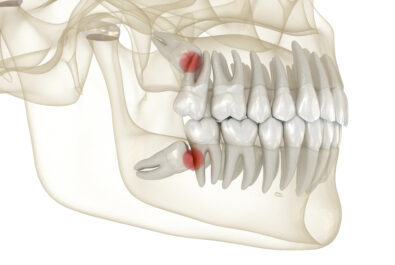Wisdom teeth, or your third (and last) molars, typically erupt anywhere from the late teens to early twenties. Surprisingly, that’s actually how they got their name, “wisdom” teeth, because this age range is know as the “age of wisdom.” Regardless, however, they do not indicate anything about your actual intelligence. In fact, they could cause more harm than good, especially when they come in misaligned since they can affect any surrounding (and otherwise healthy) teeth. In order to protect your oral health, your dentist may recommend extracting these teeth – because they can be dangerous in certain instances.
Wisdom Tooth Extraction
It’s becoming increasingly popular to remove your wisdom teeth nowadays – for good reason, too. Without extraction, a misaligned wisdom tooth could cause the surrounding (otherwise healthy) teeth to shift – causing malocclusion (bite misalignment). On the other hand, impacted third molars open up a whole other world of complications – creating the ideal environment for infection to grow. When a tooth becomes impacted, this means it actually gets stuck between your gum tissue and jawbone. Lastly, even if your wisdom teeth are able to fully erupt without causing any damage (supposedly), they’ll likely make for more hard-to-reach places when you’re brushing your teeth. Without daily brushing and flossing, bacteria is left to grow and spread – leading to infections.
Is the risk of oral infections worth keeping these extra teeth? Probably not.
Why Do We Have Third Molars?
In the past, our ancestors relied on this final set of molars to help them chew through the extremely tough food they had to eat. However, at the time, their jaw structure was actually much larger than ours is today. Now that we don’t have enough space for these teeth to come in (most of the time), they’re causing more damage instead of helping us to eat – but our foods are much easier to chew and digest now than they used to be.














